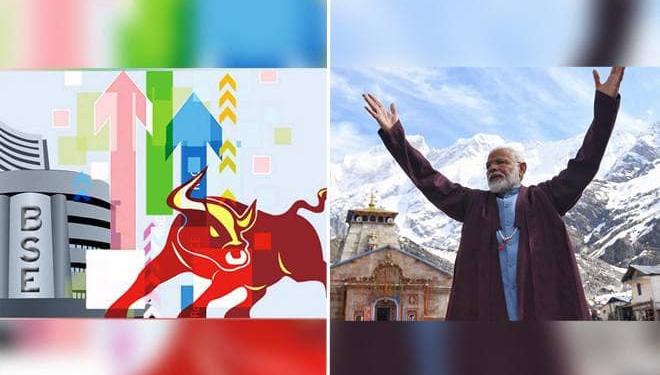Sensex, the benchmark index of the Bombay Stock Exchange broke all the previous records to reach 40,000 points in the first 20 minutes of trading. This is highest ever tally reached by Sensex in history. The benchmark index gained more than 660 points. The positive response in stock markets was due to BJP nearing towards the majority and completely broke down of major opposition parties. In Uttar Pradesh, the largest state with 80 seats, BJP is performing exceptionally well and even the big leaders like Akhilesh Yadav are trailing. Previously Sensex rose around 1,000 points a day after the exit poll results were announced.
The investors in the market, whether domestic or foreign, like a stable government therefore when BJP came to power with a full majority the market responded positively. Investor sentiments were so high because, after 25 years of coalition governments, a party finally had a majority of its own. Ever since BJP came to power at the centre, the performance of the stock markets has been directly proportional to the party’s performance in every subsequent state assembly elections because if the same party is in power at centre as well as the state, there is coherence in policies. The reformist agenda of BJP is also responsible for uncanny sync in the performance of BJP and stock markets. And the centre of it all is one man – Prime Minister Narendra Modi.
PM Modi has brought the macroeconomic status of the country to a significantly better condition than what he inherited from the previous UPA regime. The fiscal deficit has come down from about 5% of the gross domestic product (GDP) in 2012-13 to 3.5% of GDP in 2017-18. The inflation rate has been brought down to 4 percent from 10 percent in 2012. The GDP growth of the country has been remarkable under the Modi government. The sound macroeconomic conditions will help India to attain PM Modi’s dream of double-digit economic growth.
We analyzed the performance of Sensex with respect to BJP’s performance in state elections that took place after Narendra Modi won the historic 2014 Lok Sabha elections. The numbers present a very interesting story.


After coming to the centre as the prime minister of the country, Narendra Modi took some bold reforms like GST, IBC to improve business conditions in the country. The impact of these reforms is visible in the improvement of ease of doing business and healthy economic growth. PM Modi enjoys high trust ratings among international financial institutions like World Bank, IMF, rating agencies like S&P, Moody’s and many others, therefore, the foreign investors are bullish about Indian economy for as long as Narendra Modi is in power.

























